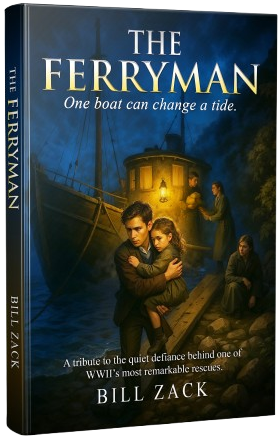

The strait, so familiar under moonlight and silence, had become a living thing—heaving and angry, its surface boiling with chop. They would have to cut east first, then arc north to clear the shoals. Any drift would pull them into open sea. Or onto the rocks.
“Hold the bow steady!” Lars shouted, bracing himself near the fuel drums.
“I’ve got it,” Jakob shouted back.
He caught sight of the next wave just before it hit. He adjusted the rudder slightly and took it at an angle, but the crest slammed them broadside anyway, drenching the engine housing and knocking Lars to one knee. The storm was accelerating now—wind gusting hard enough to tear loose the tarp forward and whip it into the sea.
Lightning flashed far out over the water, casting the whitecaps in stark relief. For a second, Jakob saw it all—the churning sea, the lines taut and straining, the empty coastline shrinking behind them. And in that second, he thought of his father. He thought of that morning—gray and still—when the boat had vanished past the breakwall and never returned.
Another wave crested over the bow, but the boat held. Spray lashed his face and filled his mouth with salt. His arms shook from the effort, but he kept the line true. He could no longer see the Swedish coast, but he knew where it would be—beyond the storm, beyond the dark.
Behind him, Thomas climbed to the stern and steadied himself on the railing.
“They’ll be looking for us in this!” he shouted.
The waves had grown steeper, peaked and curled by wind. Jakob held his course, eyes fixed through the streaked glass, his jaw clenched hard enough to ache. Then—through the wiper’s rhythmic swipe—a flash of artificial light broke the dark to port.
A search beam. He stiffened. Another second passed—then a horn split the storm, deep and unmistakable. German Kriegsmarine.
Lars appeared at the wheelhouse door, soaked to the bone. “Cutter,” he said grimly. “Big one.”
Jakob didn’t answer. The beam swept across the water again, found them, held. A burst of gunfire rang out—short, clipped. A round punched through the upper frame of the wheelhouse, splintering wood above Jakob’s head. Glass cracked.
Astrid ducked instinctively below. Thomas climbed the ladder, revolver half-raised, but Jakob shook his head sharply. “No shooting,” he said. “It’ll only slow us down.”
More shots came. A few struck the waves behind them. One clipped the stern rail and sent sparks flying. He adjusted the throttle—easing it down, not up. Let the cutter think they’d try to run straight. Instead, he angled east, toward the shoal—the very edge of a submerged reef he knew by feel, by current, by the way the sea moved above it.
The cutter swung hard to intercept, its beam blinding now. A second horn blast and more gunfire. Jakob could hear Astrid shouting something below, the girl crying softly. He blocked it out. Every part of him was focused on the wheel. “Brace!” he called.
The bow of the patrol boat emerged suddenly through the rain, enormous, gray, bearing down with speed that dwarfed them. Its spotlight locked, its deck crew shouting. Then Jakob turned. Hard starboard. Throttle back. Trim adjusted.
Fjordblink heeled over, caught the side chop, and slipped past the cutter’s prow by meters. The wave from the larger ship’s displacement struck them broadside, lifting the trawler and nearly throwing Jakob against the wheelhouse wall.
But they stayed upright. “Hold on!” he shouted.
And there it was—just beginning to roll across the surface like smoke from a broken world. Low fog, born from warm water and cold storm, curling between swells like something summoned. Jakob drove straight into it. The cutter followed, but slower now, more cautious.
He cut the throttle for three beats—let the sound vanish—then steered blind through the reeds of current he knew better than land. A rocky spit jutted north, just below the waterline. He rode its edge, close enough to feel the keel shudder with warning.
Behind them, the cutter’s engines hesitated. The beam passed once more—aimless. Then again, too far west. And then it was gone. The fog thickened. The storm softened. Rain still fell, but the sea beneath was changing—less angry now, more tired.